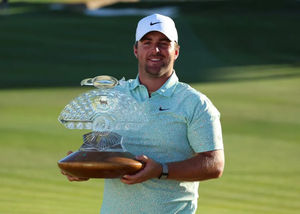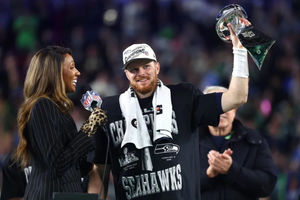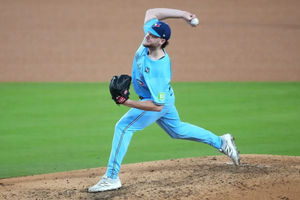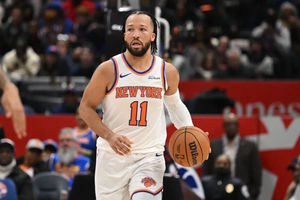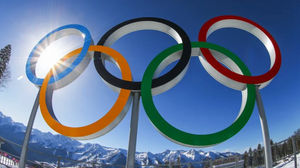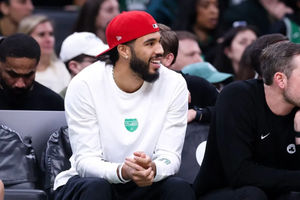How A Career Ends: Mike Marshall, Ph.D., The Outcast Screwballer Turned Outcast Pitching Coach

Tell Me When It's Over is an interview series in which we ask former athletes about the moment they knew their playing days were over. Today: Mike Marshall, the rubber-armed screwballer who won the 1974 National League Cy Young Award and who now believes his unconventional methods could eradicate pitching-arm injuries.
Marshall is a career baseball outcast. As a player, he developed a reputation for being too smart (and maybe too union) for his own good. As a pitching coach, he and his ideas—he advocates an awkward-looking upright pitching motion that even his students describe as throwing "like a girl"—have been likewise relegated to the sport's margins.
No one denies that his credentials are impeccable: doctorate in exercise physiology, 14-year major-league career, three-time league leader in saves, four-time league leader in appearances, five-team league leader in games finished, three Fireman of the Year awards, two All-Star selections, the Cy Young, and two major-league records—106 pitching appearances in a single season (1974) and 13 straight appearances that same year—that are almost certain to last forever (or at least, he might say, until people start listening to Dr. Marshall). But the baseball establishment, despite teams' heavy investments in pitchers who year after year throw fewer and fewer innings, wants nothing to do with Marshall. Occasionally, the feeling seems mutual.
Mike Marshall pitched for nine different clubs—the Tigers, Pilots, Astros, Expos, Dodgers, Braves, Rangers, Twins and Mets—over his career. He pitched his last major-league game against the Expos on Oct. 2, 1981. He recently closed his Pitchers Research/Training Center in Zephyrhills, Fla., but he continues to share his ideas about pitching through his website, drmikemarshall.com.
* * *
When I was 11 years old I was going with my uncle to Eastern Michigan University, up to Ypsilanti, basically. We were going on a back road, and there was an unmarked railroad crossing, and he just drove into the crossing, all of a sudden. There were trees on each side of the road, but he did see, out of the corner of his eye, this train coming. He tried to hit the brakes, but it was early morning, the road was still damp from the dew, and he skidded and hit the train sideways, just behind the engine, with the driver's side door impacting the train. Of course, it threw the door open, and he went out, and somehow I stayed inside. My vague recollection—what I can remember as an 11-year old—is that he grabbed and pushed me under the dashboard. There were no such things as seat belts at that time. And so he was killed and my back was severely injured.
I figured this out relatively quickly: I needed to stand straight up. I needed to not bend forward at my waist. And if you take a look at my pitching style, I stayed as straight up as I could. I didn't raise my pitching leg high above my body or follow through with my cap touching the ground or anything like that. I stayed pretty much straight up. Now my first year in the major leagues with the Tigers, my motion was not that dramatically upright because the back wasn't that big of a problem. But as I got into pitching more frequently it started to get bad again.
I could not sustain bending forward and trying to field. It got to where I couldn't put my glove on the ground. [Chuckles] Not much of a shortstop if you can't put your glove on the ground.
So it pretty much was a lost cause to continue to try to play shortstop. I loved it. I loved the hitting. I loved the base running. It's just my back would not allow me to do it. Had I not had that accident I think there's a good chance that I'd have continued as a shortstop. But after the '64 season, when I was an All-Star shortstop for Chattanooga in the Southern League, at the end of the season, I couldn't bend over. I could barely swing a bat, and I said, "OK, I'm coming back next year as a pitcher, just to make enough money to finish my bachelor's degree and get my master's degree started." Then I was going to go into high school coaching somewhere. At least I hoped.
* * *
I was an early maturer. When I was 12 years old I was probably biologically 14 years old. I was the second-tallest in sixth grade, and then by the time I was in senior high school I was the shortest guy. You know, I matured and finished my growth spurt early, and so I had more skills, more speed and so on, than most kids my age. My father played fast-pitch softball and some baseball. He was a great fielding first basemen. So he took time with me to work on fielding. He hit ground balls and all that. And I loved playing the infield. I loved trying to make plays on balls that you shouldn't be able to make.
Early on, I knew that I wanted to play professional baseball. And I did get an opportunity right out of high school. Of course, it was mainly because they could finance my college degree that I accepted the signing bonus.
Managers knew I had options. Everybody knew I had options. And it's hard to bully a guy who has options.
My mother said at 5 years old I told her I was going to play professional baseball. She didn't even know what that was, but she said "That's good, dear" [laughs]. You know how moms are. But also, very early on, I fell in love with science. I found science, at all levels, very intriguing, and I wanted to know more. I was insatiable about the science courses I took. Certainly when I got into college, my mind just went, "Whoa, what is all of this stuff?" And when I hit the kinesiology course, my life came into focus. I knew exactly what I wanted to be when I did that. It was that big of an impact on me. I wanted to learn everything I possibly could that had to do with kinesiology, which includes just about everything because you have applied anatomy—that's the huge part of kinesiology, the human movement. You have to understand what muscles and how they do it and where. And then motor-skill acquisition. And all of these courses just sort of came together and brought this collage of information from everywhere in the sciences into my passion. I wanted to know everything I possibly could. And I never, ever would have made Major League Baseball had it not been for taking that course. I was doing what my coaches were telling me, and as soon I started getting into Newton's three laws of motion and applied anatomy, I realized that everything that they were teaching is absolutely wrong. And so I started doing it per the science. Had I not done what I'm telling others to do, I never would have been able to accomplish what I accomplished.
I came to Michigan State University wanting to be a football, basketball, and baseball coach in high school. That was the extent of what I wanted my education to be. I wanted to play professional baseball to see what I could be. I didn't consider myself highly gifted. I mean, I could run well. I could throw well. I didn't believe I hit all that well, and though my dad helped me with my defense I didn't feel that I had the same fielding abilities that I saw many other shortstops display. I'd watch them and say, "I wish I could do that." It wasn't until I got into the kinesiology course that I started to see and broadened my skill set. And, of course, by that point, my back had said: "OK, that's enough of this. It's time to go into pitching."
I am an anatomy nerd. I will not say "lat" if I can say "Latissimus Dorsi." I'll not say "pec"; I'll say "Pectoralis Major." I just can't baby-talk to people.
* * *
Reality sets in pretty quickly when you get into the high school years and now you're playing against other mature people who are the same biological age as you. And then you go into pro ball and you see everybody who's genetically superior to you when you go to spring training. So the reality set in for me. And I tried to do the best I could, but until I hit '64—and I signed in 1960—the first few years of '61, '62, and '63, I did OK. I was fine, but fine doesn't make it to the major leagues. When I hit kinesiology, I felt that I was now going to start doing something meaningful as a shortstop and a hitter. My problem was my back just wasn't going to let me do it. It just flat out said, "No, it's not going to happen." I mean, I'd play hard one night and then I wouldn't be able to bend over and touch my toes the next night. Eventually I had to have the surgery. But that didn't close it for the pitching.
I feel that I spent 14 years being better than I ever thought I could be. You know the song, right? "For one moment in time to be better than you think you could be?" I was, for 14 years. I couldn't believe that I was that good of a baseball pitcher. I never expected I was going to be that good. When I started my research and started to do the things that I felt were right, that the traditional pitching coaches said were wrong, I had no idea where it was going to lead me. I just knew that I had to trust science. And it was between '71 and '72 that I figured out how to apply Newton's first law to my baseball pitching motion, and how pronation could enable me to throw pitches of higher quality. That just opened me up. I was then a pitcher who had answers for everybody. And I never took a day off.
I jogged this morning. I've jogged every day of my life that I could stand upright. Since 1965, I think it was. I've become obsessed with making sure that I have a lifestyle that's healthy. Fitness enabled me to pitch 106 games—and I feel I could have pitched more. I feel I could have easily pitched a single inning in every single game, maybe more. I never got stiff, sore, or tired. Never did not have an answer. That doesn't mean that hitters didn't surprise me. They do that. They're intelligent beings. They can hit just about any pitch that they've seen. Nobody can throw a pitch that is so good that you can throw it over and over and over again to a quality major-league hitter and not have them hit it hard. But I was never concerned that I couldn't get anybody out. It was a matter of reading his intent and doing what he didn't want me to do.
* * *
I was that smart-ass college kid, you know.
You did not get any respect for your education within baseball. In fact, you were considered a danger. That you could actually understand what they're saying was bullshit: They didn't like that too much. I wasn't an accepting kind of person. They'd tell me what to do, and I would say, "What? That makes no sense whatsoever. And I want to talk to you about Sir Isaac Newton." You know, it was not easy for them. One of my favorite managers, Jack Tighe, he'd come out and he'd say: "Listen. I'm just going to tell you what I think. If there's anything in what I say that you think will work for you, please use it." That's it. He knew that I loved baseball and that I was giving to all my teammates in any way that I could to help them and the team, and he was gracious enough to not get upset if somebody came up to me and asked about this or that and I answered it. He didn't get bothered by it. But there were others who did—other managers, minor league level and major-league level, who did not want me talking to anybody. In fact, they used that as a reason why they had to get rid of me: My ideas were seeping into other players, and that just couldn't happen.
I think what it was was they knew I had options. Everybody knew I had options. And it's hard to bully a guy who has options.
I'd been to the big leagues in '67. This was '70. So I'd been to the big leagues with Detroit and the Seattle team, the Pilots. But the Houston team didn't appreciate a lot of what I was doing. You know, "We want you to do the Exer-Genie. We want you to run the mile for time." And they just had a whole list of things that were counterproductive. And I said: "Not trying to tell you what to do here, but I'm not going to do any of those things. They don't help me pitch. They will cause problems, and I'm not going to do it." Now the pitching coach was watching me throw every day, and he was just extremely excited about what I was doing. And so I came in after the game and the pitching coach said to me: "Hey, we've got a doubleheader tomorrow. We're looking for a starter. Would you like to start?" "Great. That'd be fine."
So I get called into the manager's office, and I expected to be told I'm going to start one of those doubleheaders the next day, and he said, "No, we're sending you back down to Triple A." I said: "Oh, really? Oh, OK." And so I packed up my stuff and flew back to Houston. We were on the road. And I called the general manager and I said: "I'll give you three days. Trade me to Montreal, Boston or Detroit." Because all three of them had Triple-A teams near my home so I could put my family at home and finish the season that way. And I said: "And if you can't do it in the three days, I'm out of here, and you'll get nothing for me. I'm going back to finish my doctoral degree and we'll see y'all later. Best wishes." But he traded me before noon, and I went to Montreal. and really that was the start of my major-league career. I ran into Gene Mauch, and Gene Mauch was not intimidated by anybody. My intelligence didn't bother him. He loved it. He liked to talk to me about strategy, pitching strategy and training strategy. These are things that he didn't have in his educational background, but he was insatiable for information. And that just formed a friendship. I mean, imagine a manager asking me questions.
And Walter Alston, he also had taken a kinesiology course, so he and I got along fabulously. But there were other managers who didn't appreciate me in the meeting at all. Not that I'd say anything—I'd just sit there. I knew not to say anything, but they knew that I knew what they were saying wasn't, you know—I didn't agree with it. Even though I'd try to sit absolutely still and give no signs one way or the other. And maybe that was a problem.
* * *
My first full year in the major leagues was 1971. My first year of professional baseball was 1961. I had some ups and downs trying to find out what I was doing in the first few years. '71 wasn't all that good for me either. But the last half of it, Gene Mauch freed me up. He gave me the right to do what I wanted to do on the pitching mound: throw the pitches I wanted, make my own decisions, and so on. And the last half of that season went marvelously well. And then here came 1972. I was ready. And, you know, 1.78 ERA, I just flat kicked ass. It wasn't like I was a surprise. I'd been in Major League Baseball since '67, up and down, so here I am five years later, and I'm finally put my game together. That's what it was. I had a plan in my mind of the pitcher I wanted to be, and people kept stepping on it, not letting me do it. And I couldn't get to where I was doing it until finally Gene Mauch gave me that chance halfway through 1971. And from then on I was the pitcher that I wanted to be.

If I had known then what I know now? Oh, my goodness. There was so much more that I didn't know. I could have been one hell of a baseball pitcher. It worked all right, but there were gaps in what I could do at certain times in a game to different hitters, in different situations. I needed to expand my game. Most notably, I never threw a curveball. I didn't know how to throw a curveball. And then I figured out one day how to pronate the release of a curveball. Unfortunately it was seven years after I was out of professional baseball. I had a fabulous curveball seven years out of professional baseball. Just nasty.
I've got something nobody else thought of in the history of baseball. I mean, how long has the history of baseball gone on? And I teach a brand-new pitch. I had a screwball that nobody understood, and still don't. I'm probably still the only one who throws that kind of screwball, except for the people I teach how to do it. Those are the things that, as a research scientist, are exciting to me.
I'm not really sure why, but I think maybe the front office had soured on my player-rep activities. You've got to factor all of that into everything that happened in my career. My dad was a member of a union. I believe in people being treated fairly and so on and so forth. Very early on I was elected the player representative of the 1968 Detroit Tigers. They elected me in spring training. And the manager, when he sent me down, said, "We can't have you be the player representative of this team." And that's why they sent me down. I had a 1.9-something Earned Run Average the year before, and I did fine in spring training, although I was starting to bring in my screwball, and they sent me down. So I missed '68, but in my mind it didn't matter because I was working on the screwball.
I'm much like Tiger Woods in that way. He gets a lot of criticism because he changes his swing or tries to learn to swing better. And I know how difficult and how almost impossible that is. Once you have a motor engram tied to your swing or your pitching motion, it is really, really difficult to make adjustments. Big adjustments, especially, as he's tried to do. And when the pressure's on, like it was on him last week, it fell apart for him. But it didn't fall apart the week before, except for the last nine. He'll get back.
But I am not afraid to stop what I'm doing to drop back and make sure I have what I need to have more success. I was not interested in being a right-hand setup guy. I wanted to get everybody out. I wanted to pitch to every batter, and I wanted to close every game. That was my goal. And so I had to develop skills in order to do that. And that's the way I look at Tiger. I'm greatly impressed with his willingness to put it all aside and say, OK, I'm going to learn it, and it's going to take a long time. It's going to take a couple years. You know, swinging a golf club, the feel and the touch and all of that is so fine that it's going to be hard. But if he can be number one in a tournament in fairways hits and on the green, forget it, gentlemen. He's been winning tournaments out of the trees for years. Now he's going to win them out of the fairway, and I hope sometime soon. I'm rooting for him.
That's the kinesiologist in me. I want everybody to be the best they can. And if you're doing something wrong, fix it, don't accept it.
* * *
I was with the Mets. We were playing, I believe, Montreal. They were in it, and I'd been basically a setup guy for a young right-handed curveballer, but he was sort of fading in the pressure of the end of the year. So I believe Torre put me in to close the game. Of course, a guy got a little jam out to left field, and my left fielder was playing too deep. When I'd pitch I had have to have my own defense because I pitched so much differently than everybody else. The biggest change in my career was when Gene Mauch allowed me to set my defense. That freed me up. He put me in charge of everything that happened: the pitch selection, the defensive alignment, everything. If you're trying to pitch with the starter's defense, and you don't pitch the same way the starter does, you're going to give up hits that should not be hits. And that's what happened in that game.
I think we lost the game. I don't remember what the score was, when I came in or whatever. But I remember feeling very irritated that I couldn't get that fellow to move in farther. But he wasn't a very ... well, I shouldn't badmouth him. He didn't have a lot of range of motion. That's why they put him out there in left field.
The Twins released me the year before. And then in that year there was no season 'til near the end [1981 was shortened by a mid-season strike, and Marshall was unsigned at the beginning of the year]. I don't touch a ball in that entire time, then I go in there and have a 2.6 ERA. And that's something, because I'm not fit, I don't have quality on my pitches, and I'm still able to do that. I fully expected that I would be pitching the next year, and planned to, but the Mets released me [laughs], because the manager didn't like this guy that got free agency into professional baseball.
But then I had domestic situations that prevented me from accepting a couple of offers that I had. And I still felt that I could've come back and pitched for another two or three years. I didn't care about necessarily closing. I just loved to pitch. So then I went into amateur ball and I started pitching a lot. I didn't know that I was going to be done then, but I'd certainly done everything that I wanted to. I probably would've been better off if I'd thought about talking to people about being a pitching coach at that time, because there were people who wanted to know how I was able to do what I did. But as I said, I had some personal things to deal with. I had daughters who were sophomores and seniors and going into college, and there were things that they needed me for much more than I needed baseball.
I knew I couldn't go into coaching in professional baseball, where they did not appreciate research and all the things that I would try to do. I mean, if I came to coach, to develop baseball pitchers, I'd be taking high-speed film of each, I'd be analyzing what they're doing, I'd be explaining. I'm going to bring the classroom to the baseball field.
And the only place I could do that is where there actually are classrooms, and that is at colleges. I didn't think I should go for a Division I school because they don't like their coaches to be teaching. I wanted to teach. I wanted to be in the classroom. So I was looking at Division II schools. I went down to Florida and checked with the University of South Florida about being a pitching coach there. Robin Roberts was not interested. And then I checked over at the University of Tampa, and they didn't have a pitching coach. So I volunteered to be their pitching coach. And the team did well. And the next year I got the offer to be the head baseball coach at St. Leo College. And I was happy just to be there.
Unfortunately the athletic director didn't understand what we were trying to do and decided he wanted to go a different way, which is always the way to say, "I don't know what the hell you're talking about." But in any case, that's what I wanted to do. I got to do it. I then tried to do it with another school out in Arkansas. In both situations I feel that what I was doing was very successful. The teams and the players performed better than they would have given the resources we had and the talent we had.
So I tried three different times to get the thing going in college, in Division II schools. And each time the athletic director just didn't understand what we were doing. The players did. I don't think the players had any problems with what I did. A great many of them had opportunities after college that they never would have had otherwise. But it never seemed to work out with the athletic directors.
So, I find myself unemployable now. I can't go teach because my name is too well known, and I can't go coach because the Ph.D. and Cy Young Award winner are counter-intuitive. You know, they don't work in one place or the other, for one reason or the other. The academics don't like the Cy Young Award and the coaches don't like the Ph.D. And you've got to have sort of a consensus of the faculty and the coaching staff in order to get a job.
I feel I have so much more to give, and I'm not able to give it, because I'm not in charge of giving it. So I give everything I have to my website. I'm trying to get every piece of information I have out on that. But I would love to be in a classroom. I'd love to have research equipment facilities and do so much more that I feel that I can do. But I'm not in charge of hiring me.
And, you know, that's just the reality of life. I'm not upset by it. I've found another venue. If it hadn't been for the internet, you know, I would be a frustrated person. Can you imagine walking around with all that stuff in your head? You know, it's hundreds of thousands of words and pages and all of that, but it's cathartic for me. I wake up at 5:30 every morning, and I've got three hours where I can sit and just talk to folks about pitching and answer their questions. It's almost as good as being in a classroom, but not really.
Anybody can do what I did. Anybody! I am no special human being, physically. Anybody can do what I did, and I cannot believe that baseball is so backward, especially with these new, educated general managers, that they are completely ignoring what I'm saying.
I think of my uncle, obviously, every day. So I have to live his life.
I'm going to jog every day and eat correctly and do everything I can, not smoke and all that kind of stuff, to see how long this body will last, because I've beat the hell out of it, I'll tell you that. I've used every bit of it and I love it.
What I've accomplished in my life surprises me, but that doesn't deter me from wanting to make sure everybody has the same opportunity that I had, because I think they can all become more than they ever thought they could be, too, as a baseball pitcher. And I'd like to help them do it. And I've got it out there. All my friends say, You know, when you die, as soon as you die this is going to be how everybody pitches. They just don't want to give you credit. I said, I don't want the credit now, but the problem is that might be true.
Rob Trucks is the author of Cup of Coffee, a series of conversations with former pitchers whose major-league careers lasted fewer than 50 innings. His other work for Deadspin includes interviews with former NHL goalie Clint Malarchuk and the late Dave Duerson, and an oral history of Big Star co-founder Alex Chilton's time in Tuscaloosa. You may e-mail him at [email protected] or follow him on Twitter at @tusktusktusk. Theme music and video courtesy Steve Wynn.
Related
The NBA’s Tanking Problem Is Getting Worse — Not Better
NBA Picks Tonight: Three Best Bets Before the All-Star Break
The Biggest Question Facing Every 2026 MLB Contender
Best NBA Betting Picks for Wednesday Feb. 11th Slate
- Early Super Bowl LXI Odds Favor Seahawks, Sleeper Betting Picks & More
- Sunday Feb 8th NBA Picks: Three Best Bets Today
- Super Bowl Betting Preview: Seahawks vs. Patriots Breakdown & Pick
- The Most Fun Super Bowl Prop Bets You Can Make This Year
- Super Bowl 60 Prop Bets: 10 Best Bets for Patriots vs. Seahawks
- UFC Fight Night at the Apex Best Betting Picks and Predictions
- NBA Betting Picks for Friday Feb. 6: Post-Deadline Predictions







